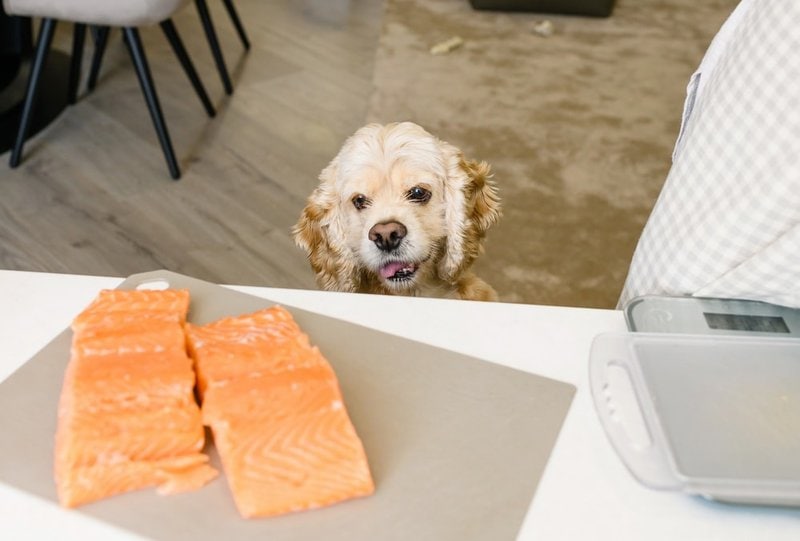Some foods might be on our tables more than usual during the holidays. Salmon is one of the most popular types of fish for humans to consume. Do you have a dog that may eat raw salmon? So, can dogs eat raw salmon, smoked or cooked?
Dogs can only eat cooked salmon as salmon is a healthy food, rich in omega-3 and vitamins, especially when properly prepared, frozen, and cooked. However, dogs should not be eating smoked or raw salmon due to the health risks imposed by their consumption. Salmon also works as a great alternative to chicken which some dogs may be allergic to.
As much as you would like your dog to enjoy the same meals you are, it’s important to prioritize its health. Portion control is the key when adding tasty treats to your pooch’s diet. Read on to find out if you can feed your pooch salmon in raw, smoked, or cooked form.
Can Dogs Eat Salmon?
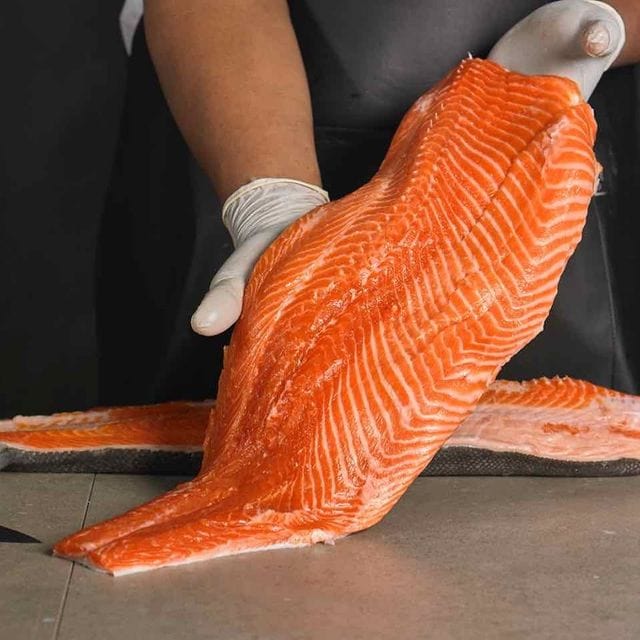
Yes, dogs can eat salmon so long as it’s boneless, fresh, well-cooked, and fed in moderation. Salmon is as nutritious for your dog as it is for human beings.
Salmon is among the primary ingredients found in almost all dog food products. This is because it is rich in high-quality proteins, omega-3 fatty acids, and minerals such as selenium, potassium, vitamins A, B6, B16, and D.
Salmon is said to be a low-mercury fish, just like with prawns. Therefore, it contains fewer heavy metals and contaminants than large and long-living fish species like tuna. This means that it’s okay for your pooch to consume more often, but still, it should consume in moderation to prevent any possibility of potential and harmful build-up of mercury.
In addition, this combats overeating, and it can also cause diarrhea, gastrointestinal upset, and unwanted weight gain because of eating too much fatty fish.
However, you shouldn’t feed your dog salmon with seasoning or soaked in sauces, and it can cause illness. Also, when feeding your dog salmon, ensure there are no bones as fish bones can be brittle and sharp, and they could cause injury or irritation when swallowed.
Can Dogs Eat Raw Salmon?
No, dogs should not eat undercooked salmon or raw salmon. Whether you catch the salmon yourself or have bought some fresh ones, you should not offer your pooch no matter how good or tasty your dog thinks it smells.
Potential parasites may live in the fish’s flesh, and cooking will kill the pests after or enough freezing. The problem with salmon and other fish swimming upstream to spawn is that they could be affected by parasitic flatworms and the worms are not the issue.
The problem is that flatworms could be infected with bacteria called Nanophyetus Salmincola. The bacteria can make both dogs and humans sick, but it may affect dogs more seriously, and it can contract salmon poisoning.
Can Dogs Eat Smoked Salmon?
No, dogs shouldn’t eat smoked salmon for the same reason they should not consume raw fish. In addition, smoked salmon is not good for your dog because it’s cured, which means it has a lot of salt. As humans, a lot of salt is unhealthy, and dogs may need less salt than humans.
Although salt is necessary for a dog’s diet, too much of it is unhealthy and can cause sodium poisoning, dehydration, and sickness.
In addition, another reason to avoid feeding your dog smoked salmon is that it may contain bacteria and flukes that may lead to salmon poisoning.
Notably, if your dog ingested a small amount of smoked salmon and it doesn’t happen often, you shouldn’t be alarmed. However, you should watch your pooch’s behavior and how any symptoms may appear.
Can Dogs Eat Cooked Salmon?
Salmon is safe for dogs as long as it’s prepared correctly and contains plenty of beneficial nutrients for your dog. You must cook salmon thoroughly to kill any bacteria present, and it makes your dog safe to eat.
Steam the salmon to ensure it kills off the parasite found in raw salmon known as Neorickettsia helminthoeca and other parasites. In addition, steaming the salmon will help preserve the omega-3s in the salmon. You can also find safe salmon recipes to try to feed your dog more delicious meals.
In addition, it is vital to choose the right type of salmon, and it shouldn’t contain bones. The salmon bones may cause your dog to choke, or the bones may get stuck in its digestive tract. Double-check if there are any bones in the salmon fish, even if you purchase a cut that doesn’t contain bones.
Is Salmon Good For Dogs?
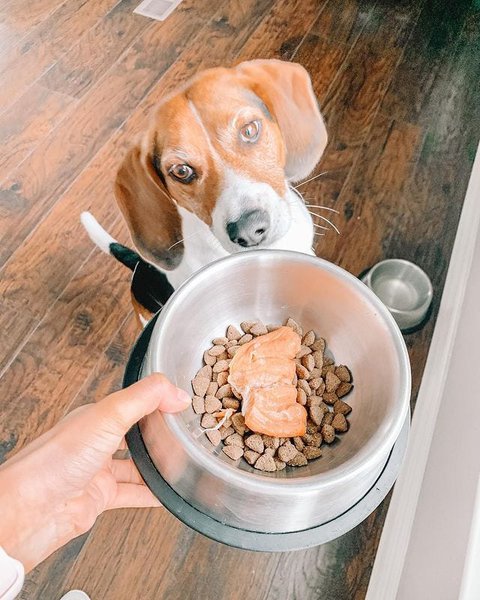
Yes, salmon is good for dogs and has several health benefits, especially when cooked and prepared correctly. In addition, salmon is a great source of omega-3 fatty acids, and it helps promote healthy skin and coat for your dog and is also useful for your dog’s heart and immune system.
Salmon can also benefit older dogs or dogs with arthritis as it helps reduce inflammation and stiffness in its joints. In addition, you can feed salmon to young puppies as it helps to develop their brains and assists older dogs to have better concentration, especially the senile ones.
In addition, salmon is high in amino acids, which is essential to ensure your dog stays active and healthy. It is also an excellent food for dogs suffering from allergies and skin irritations.
There are other nutritional benefits for your pooch, including:
- Helps in producing more collagen
- Improves skin irritation and allergies
- Improves cognitive function primarily in the older dogs
- Strengthens your dog’s immune system
- Helps to ease inflammatory bowel disease
- Helps to slow cancer cell growth
- Promotes a healthy weight loss in the overweight dogs
- Helps to prevent several skin allergies in dogs
How Much Salmon Can A Dog Eat?
Like with other meals, it is important to feed your dog salmon in moderation for its health purposes.
You should limit the intake to once a week, and the dog should consume the meal in small quantities. When considering numbers, your dog should eat about 1 oz of salmon for every 3 lbs it weighs.
Are There Any Risks Of Dogs Eating Salmon, Raw, Smoked Or Cooked?
Is salmon bad for dogs in any way? Yes, there are risks of dogs eating raw and smoked salmon. One risk is the too much sodium in smoked salmon, and raw salmon can also cause salmon poisoning.
In addition, salmon can be very bad for dogs if not cooked correctly or undercooked and could result in fatal consequences.
Salmon Poisoning
Salmon poisoning in dogs is fatal, especially if left untreated. Unfortunately, it can take up to a week before your pooch shows any signs of salmon poisoning, and also, your vet might not consider it salmon poisoning because it’s hard to diagnose and treat.
Notably, it’s possible for dogs experiencing salmon poisoning to spread the infection if you have other dogs in your house through its fecal matter.
Some common symptoms of salmon poisoning will include:
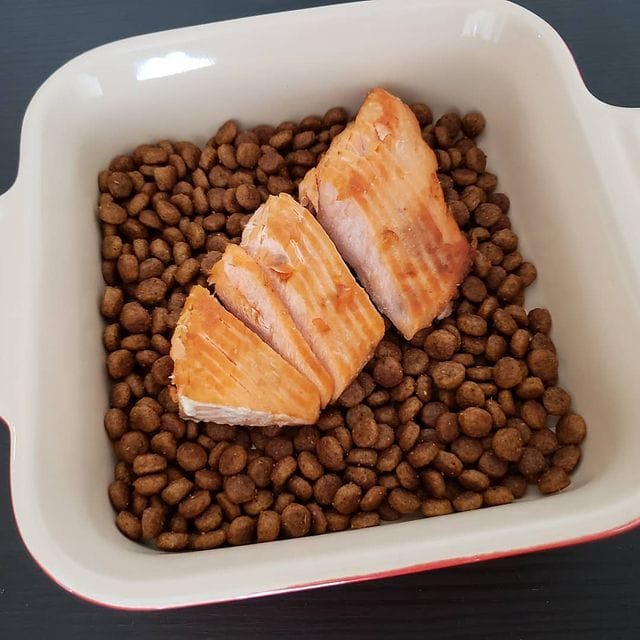
Sodium-Ion Poisoning In Dogs
Sodium-ion poisoning is more common in dogs after ingesting smoked salmon. This is because after a dog ingests too much salt, it drinks a lot of water to combat hydration, and therefore, no damage will be done.
However, if your dog doesn’t get water, its body cells will begin releasing water, and this will destroy its brain cells.
Some sodium poisoning neurological symptoms include dizziness, seizures, and headaches. Also, the muscles could lose water, shrivel and become stiff, which will make the dog start jerking and shaking.
What To Do When Your Dog Has Salmon Poisoning?
If you think your dog is experiencing salmon or sodium poisoning, you should immediately take your pooch to the vet. Inform your vet if you know or think your dog has consumed raw, smoked, or undercooked salmon.
The vet may conduct tests on your pooch, like fecalysis for salmon poisoning, to detect a parasite’s egg within feces. In addition, the vet may need a sample from a swollen lymph node to show a diagnosis for salmon poisoning.
The vet may prescribe antibiotics to kill organisms that caused the poisoning and a wormer to kill any parasites. An IV fluid may be administered, especially if your pooch is dehydrated from diarrhea and vomiting.
Your dog will be admitted to the hospital for oxygen, electrolytes, and IV fluid therapy to manage dehydration for sodium poisoning. As soon as your dog is discharged, your vet will recommend you to feed their pooch a low-sodium diet to ensure the sodium level in the blood is under control.
Fortunately, your dogs will show rapid improvement in a few days once treatment starts.
Can Salmon Poisoning Be Treated?
Treatment of salmon poisoning will usually involve two components:
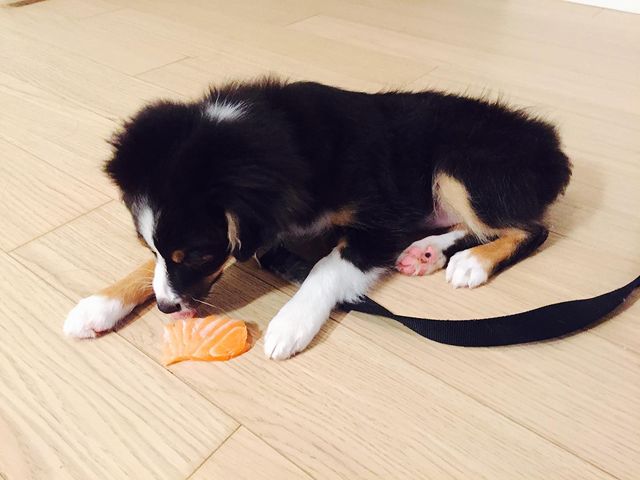
Treatment Of The Rickettsial Infection
Neorickettsia helminthoeca is the organism causing poisoning and is treated with antibiotics. The most commonly used antibiotic is doxycycline, and other tetracycline drugs may also be used. These antibiotics can be given orally, even though the critically ill dogs who are vomiting will need hospitalization for intravenous antibiotic therapy.
Most dogs will respond well to antibiotics, and you can see improvement in clinical signs within one to three days. Antibiotics will be continued for one to two weeks to ensure the elimination of the infection.
Treatment Of The Fluke
There could be remaining flukes in your gastrointestinal tract, which could reinfect your dog, and therefore it’s important to treat these flukes as you are treating the infection. Your veterinarian may also prescribe a dewormer to clear the flukes, decrease the shedding of fluke eggs in the feces or decrease diarrhea.

